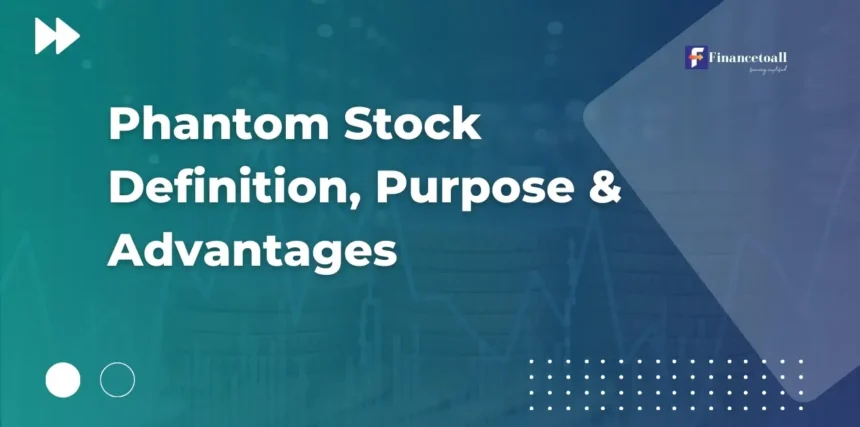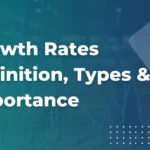Phantom Stock: The Ultimate Guide to Understanding, Benefits, and Examples
Phantom stock is a compensation plan that rewards employees based on the company’s growth, offering payouts tied to the value of shares without granting actual equity or voting rights. It is commonly used by private companies to reward and retain employees without diluting ownership.
If you’re an employer looking for creative ways to reward your employees or an employee curious about your company’s compensation structure, you’ve likely heard the term “phantom stock.” But what exactly is it? How does it work? And why is it becoming increasingly popular, especially among private companies?
Key Takeaways About Phantom Stock
- Equity-Like Rewards: Offers employees financial benefits similar to shares without actual ownership or voting rights, keeping equity non-dilutive.
- Customizable Compensation: Tailored plans with flexible vesting and performance metrics help achieve goals like retention and long-term growth.
- Ideal for Private Companies: Perfect for startups and private businesses wanting to reward employees without diluting ownership.
- Tax and Cash Flow Considerations: Employers need cash reserves for payouts, which are tax-deductible; employees are taxed as ordinary income.
- Aligns Rewards with Success: Motivates employees by linking payouts to company performance, fostering a sense of shared achievement.
What is Phantom Stock?
A compensation tool that gives employees financial rewards based on the company’s performance, without granting actual equity or voting rights. It’s also called “synthetic equity.”
Think of it as a shadow stock plan. The company creates a virtual or “phantom” version of its shares. Over time, employees earn rewards based on the value of these phantom shares, just like real stockholders would. However, employees don’t own any actual equity in the business.
Key Features of Phantom Stock
- No Actual Ownership: Employees don’t own real shares, so the company’s ownership structure stays intact.
- Mimics Real Equity: Phantom stock tracks the company’s stock value or other performance metrics.
- Cash or Stock Payouts: Employees receive cash equivalent to the value of the phantom shares or, in some cases, actual stock when the plan ends.
- Performance-Based Rewards: Payouts are often tied to the company’s growth or specific financial goals.
Example
Imagine you’re an employee at a private company called BrightTech Inc. The company offers you 500 phantom shares at $10 per share. After three years, the value of these shares increases to $20. You receive a cash payout of $10 per share, or $5,000 in total, as a reward for helping grow the business.
Why Do Companies Offer Phantom Stock?
Companies use phantom stock plans for various reasons, but the most common are retaining top talent, rewarding employees, and aligning interests with shareholders.
1. Retaining Talent
Phantom stock acts as a powerful incentive to keep key employees loyal. For instance, companies can tie payouts to a vesting schedule, requiring employees to stay for a specific period before receiving their rewards.
Example:
An employee must stay with the company for five years to fully “vest” their phantom shares. If they leave earlier, they forfeit the payout.
2. Avoiding Equity Dilution
For private companies or closely-held businesses, giving actual shares may dilute ownership and complicate decision-making. Phantom stock provides a solution. Employees get the financial benefits without changing the company’s shareholder structure.
3. Aligning Interests with Shareholders
Phantom stock motivates employees to work harder, as their rewards depend on the company’s success. If the company grows, the value of their phantom shares grows too.
How Does Phantom Stock Work?
Phantom stock plans are flexible and can be customized to fit a company’s goals. However, they generally follow these steps:
1. Grant Agreement
The company gives employees phantom shares through a formal agreement. This document outlines the number of shares, initial value, vesting schedule, and payment terms.
2. Vesting Schedule
A vesting schedule ensures employees earn their phantom shares over time. Typical schedules include:
- Cliff Vesting: Employees receive all their shares after a specific period (e.g., three years).
- Graded Vesting: Employees earn shares gradually, such as 25% per year over four years.
3. Valuation
The value of phantom shares is tied to the company’s stock price, revenue growth, or another performance metric.
Example:
ABC Corp grants an employee 1,000 phantom shares worth $5 each. After five years, the company’s stock value rises to $15 per share. The employee receives $15,000 (1,000 shares x $15).
4. Triggering Events
Phantom stock payouts typically occur after specific events, such as:
- Vesting completion
- A company sale or IPO
- Employee retirement or termination
5. Payout
The company pays the employee the cash value of the phantom shares. Some plans may also convert phantom shares into real equity.
Types of Phantom Stock
Phantom stock plans come in two main varieties:
1. Appreciation-Only Phantom Stock
This type rewards employees for the growth in the company’s stock value. Employees only receive the difference between the initial grant price and the final value.
Example:
If a phantom share’s value grows from $10 to $20, the employee receives $10 per share.
2. Full-Value Phantom Stock
Here, employees get the entire value of the shares, including the initial value and any appreciation.
Example:
For a phantom share that increases from $10 to $20, the employee receives the full $20 per share.
Benefits of Phantom Stock
Phantom stock offers several advantages for both employers and employees:
For Employers:
- No Equity Dilution: Ownership stays with existing shareholders.
- Customizable Plans: Companies can design plans to align with specific goals.
- Tax Deductibility: Payments to employees are tax-deductible as compensation expenses.
- Attracts Top Talent: A competitive compensation tool for private or growing companies.
For Employees:
- Financial Rewards: Employees benefit from the company’s growth.
- No Investment Risk: Employees don’t have to buy stock or worry about market volatility.
- Clear Alignment: Rewards are directly tied to company performance.
Drawbacks of Phantom Stock
Despite its benefits, phantom stock has some potential downsides:
1. Cash Flow Challenges
Companies must have enough cash to pay employees when their phantom stock vests. For startups or cash-strapped businesses, this can be difficult.
Solution:
Some companies tie payouts to liquidity events like a sale or IPO.
2. Complex Administration
Designing and managing a phantom stock plan requires careful planning and legal expertise. Companies must ensure the plan complies with tax laws and is fair to employees.
3. Tax Implications
For employees, phantom stock payouts are taxed as ordinary income rather than capital gains, which can result in higher taxes.
Phantom Stock vs. Stock Options
How is Phantom Stock Different from Stock Options?
Phantom stock provides cash payouts tied to the company’s performance, whereas stock options allow employees to buy real shares. Phantom stock does not dilute ownership or require employees to invest their own money.
How Phantom Stock Differs from Other Equity Compensation
Comparison Table
| Feature | Phantom Stock | Stock Options | Restricted Stock |
|---|---|---|---|
| Ownership | No | Yes (if exercised) | Yes |
| Dilution | No | Yes | Yes |
| Settlement | Cash/Stock | Stock | Stock |
| Taxation | Ordinary Income | Ordinary Income on Spread | Capital Gains |
| Voting Rights | No | Yes (if exercised) | Yes |
Real-World Example of Phantom Stock
Let’s say TechStart Inc., a growing private company, offers phantom stock to its top executives. The company grants 2,000 phantom shares to its COO at $50 per share. After five years, the company is acquired for $150 per share.
Calculation:
- Initial Value: $50 x 2,000 = $100,000
- Final Value: $150 x 2,000 = $300,000
- Payout: $300,000 – $100,000 = $200,000
The COO receives a $200,000 cash payout, rewarding their contribution to the company’s success.
Tax Implications of Phantom Stock
Phantom stock is treated as a deferred compensation plan, and taxation occurs when payouts are received. Here’s how taxes work:
For Employees:
- Payouts are taxed as ordinary income, subject to income tax rates.
- No capital gains tax benefits since employees don’t own actual stock.
For Employers:
- Payments to employees are tax-deductible, reducing the company’s taxable income.
Conclusion
Phantom stock is a powerful tool that benefits both companies and employees. For companies, it provides a way to reward performance and retain top talent without diluting ownership. For employees, it offers financial incentives tied to the company’s success.
FAQs About Phantom Stock
1. What is phantom stock?
Phantom stock is a compensation plan where employees receive financial benefits that mimic owning company shares, without receiving actual equity or voting rights. It’s also called “synthetic equity.”
2. How does phantom stock work?
Phantom stock grants employees “virtual” shares tied to the company’s performance, such as stock price growth or revenue. At a designated time or triggering event, employees receive a cash payout or stock equivalent to the value of these phantom shares.
3. What are the types of phantom stock?
There are two main types:
Appreciation-Only Phantom Stock: Rewards employees based on the increase in share value over time.
Full-Value Phantom Stock: Includes both the initial value and any appreciation.
4. Why do companies use phantom stock?
Phantom stock allows companies to reward and retain employees without diluting ownership. It aligns employee incentives with business success, particularly in private companies or closely-held businesses.
5. What are the benefits of phantom stock for employees?
Employees receive financial rewards tied to the company’s growth without needing to invest their own money. It provides a performance-based incentive with no market risk.
6. What are the drawbacks of phantom stock?
Companies must manage cash flow to pay out rewards.
Employees are taxed on payouts as ordinary income, which can result in higher taxes compared to capital gains.
Designing and managing phantom stock plans can be complex.
7. How is phantom stock different from real stock?
Phantom stock provides financial benefits like real stock but doesn’t grant ownership, voting rights, or actual shares. It avoids equity dilution while still aligning employees’ interests with company performance.
8. Can startups offer phantom stock?
Yes, startups often use phantom stock to attract and retain talent without giving up equity. It’s a popular choice for companies that plan to scale but want to protect their ownership structure.
9. What happens if an employee leaves the company before vesting?
If the phantom stock plan includes a vesting schedule, employees typically forfeit any unvested shares when they leave the company early.
10. Are phantom stock payouts taxable?
Yes, phantom stock payouts are taxed as ordinary income when employees receive them. Companies can deduct these payouts as a compensation expense.
11. What is a vesting schedule in phantom stock?
A vesting schedule determines when employees earn the right to receive payouts from their phantom shares. Common schedules include:
Cliff Vesting: All shares vest after a specific period.
Graded Vesting: Shares vest gradually over time.
12. What are triggering events for phantom stock?
Triggering events are specific milestones or conditions that activate payouts, such as:
Completion of the vesting schedule
A company sale or IPO
Retirement or termination of employment
13. Can phantom stock be converted into real equity?
Some phantom stock plans allow conversion into real equity, but most are designed as cash-settled plans to avoid ownership changes.
14. How is the value of phantom stock determined?
The value is usually tied to the company’s stock price, revenue, or other performance metrics, as outlined in the phantom stock agreement.












